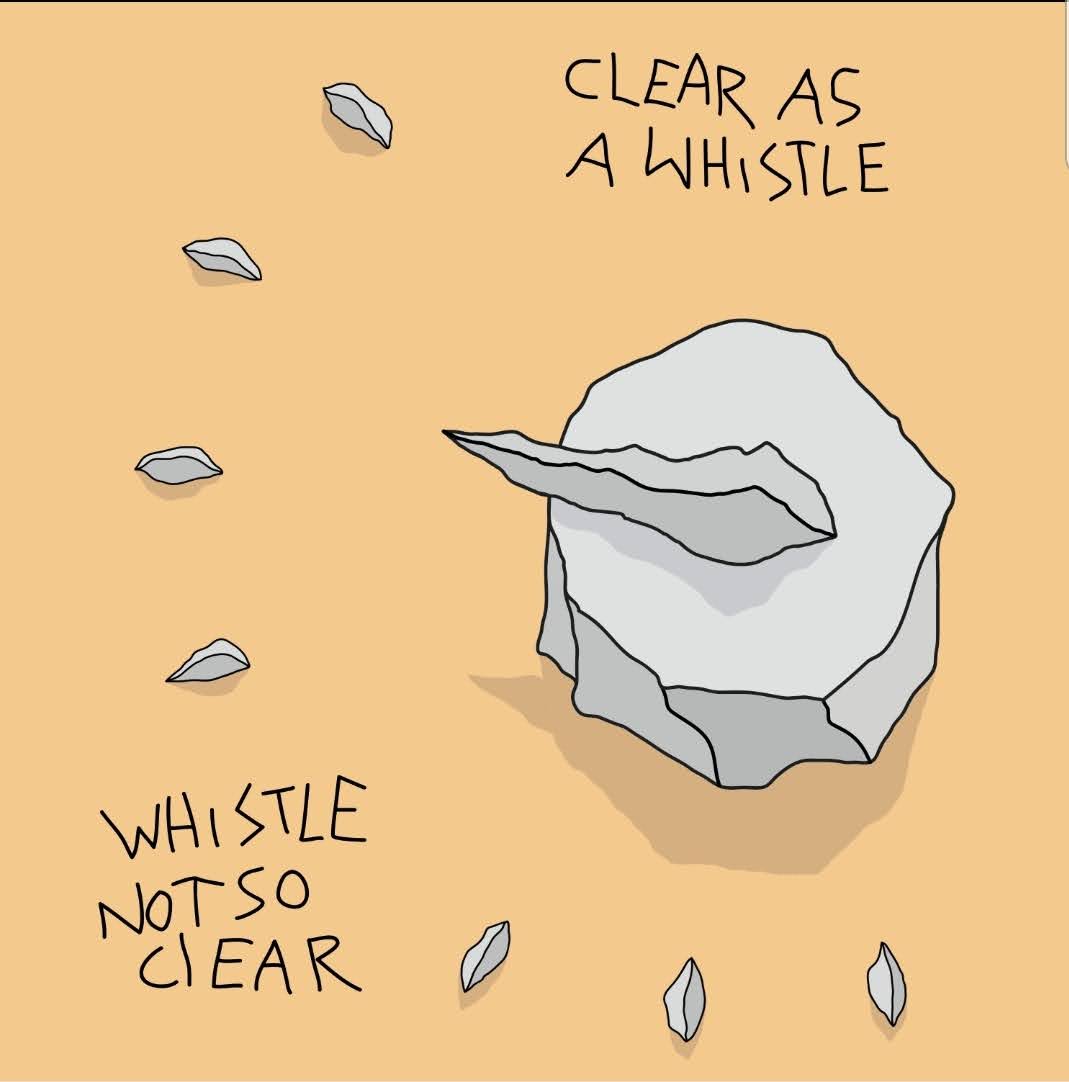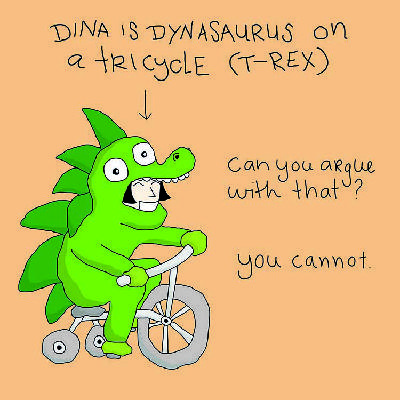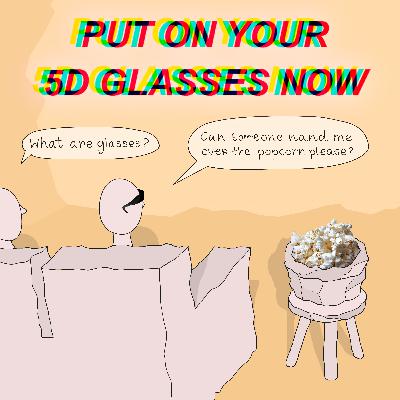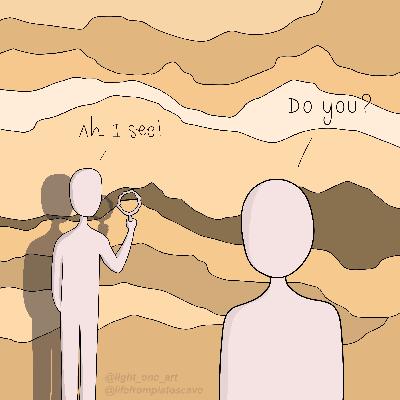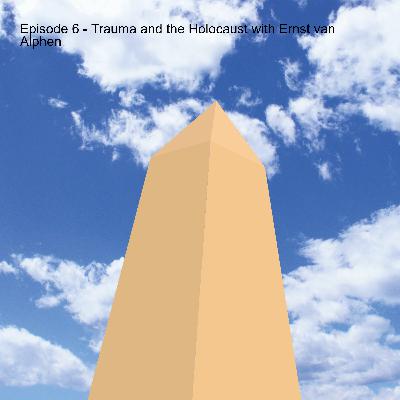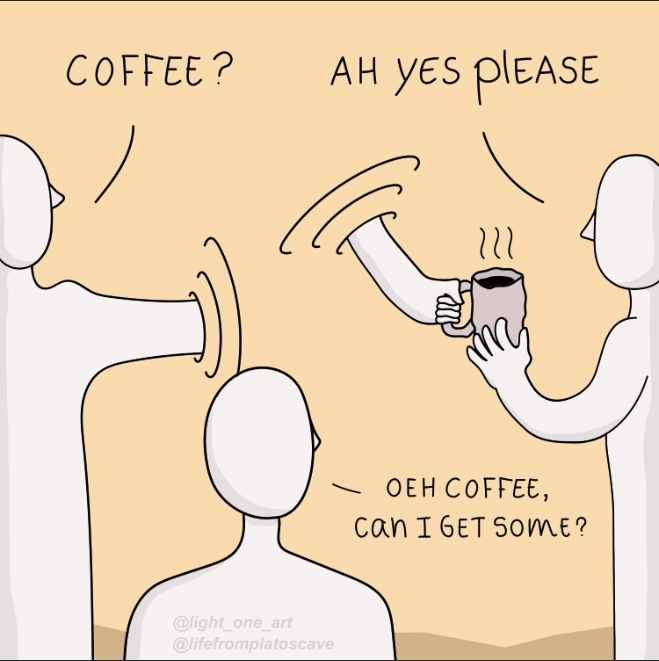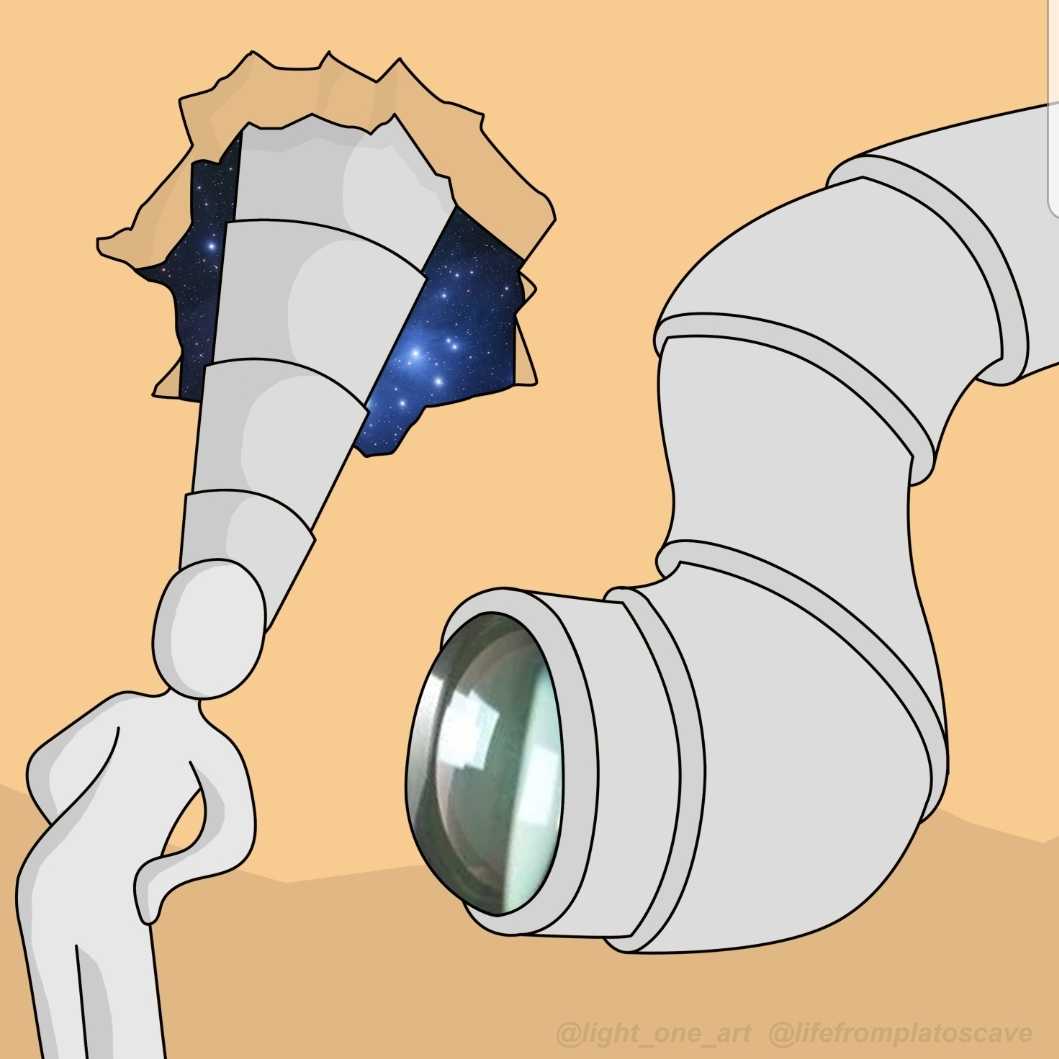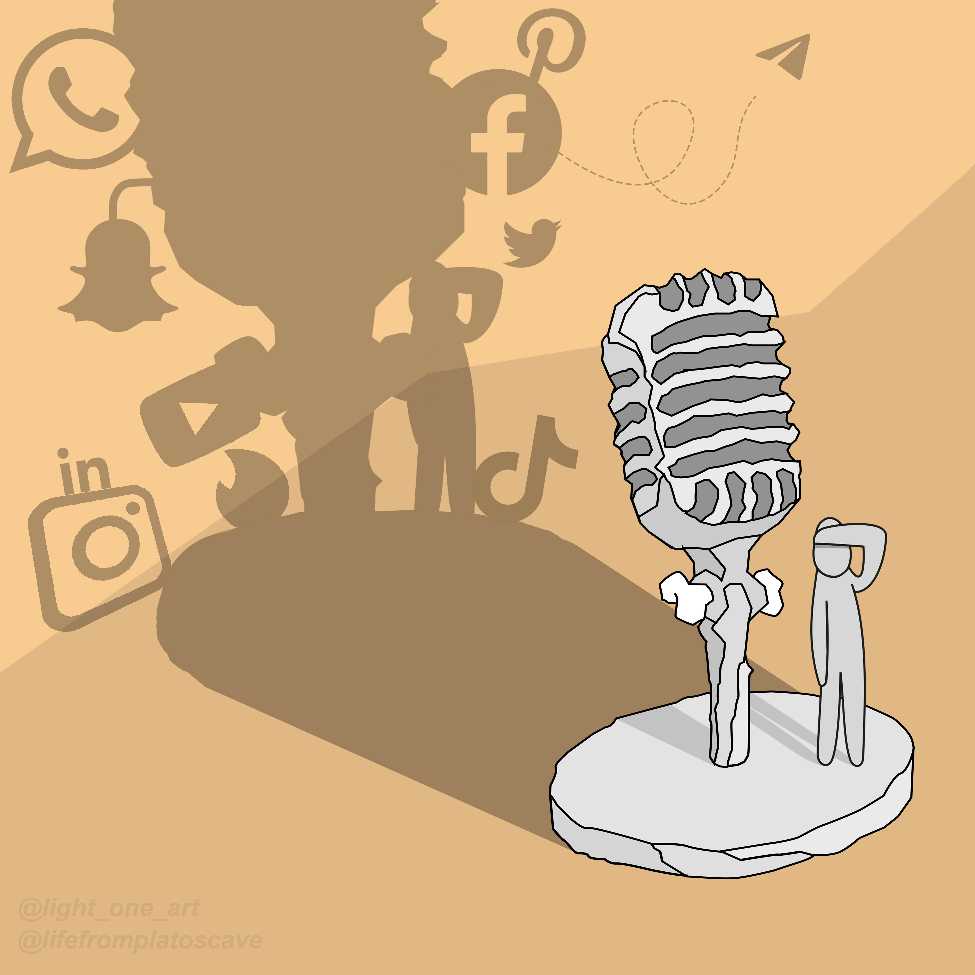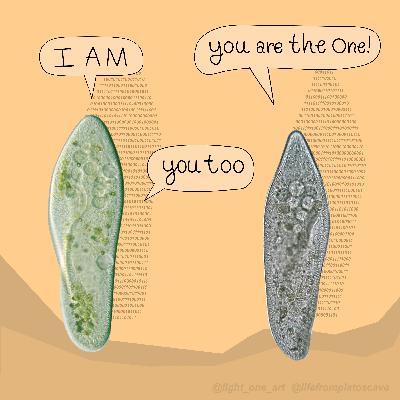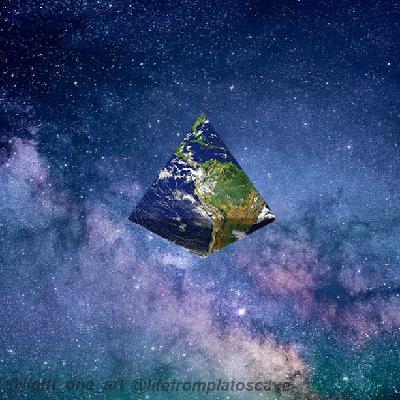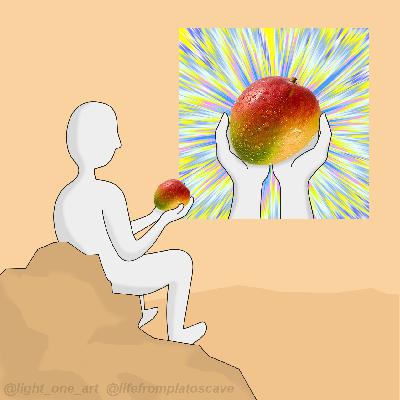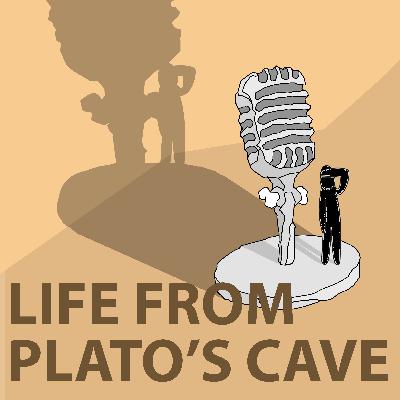Discover Interdisciplinary Philosophy
Interdisciplinary Philosophy

Interdisciplinary Philosophy
Author: Mario Veen
Subscribed: 20Played: 554Subscribe
Share
© Copyright 2020 All rights reserved.
Description
A course in interdisciplinarity by Mario Veen. In each episode I travel through Plato's Allegory of the Cave together with a guide. Together, we examine the question of what it means to learn, grow and develop in life on earth. We do so from a new perspective every time. You can use this course to study whatever interests you through the lens of philosophy, film, art, physics, spirituality and many more. All you need is the willingness to think things through and the openness to have your preconceived notions challenged.
61 Episodes
Reverse
Trailer for Life From Plato's Cave.
lifefromplatoscave.com
Follow me on Twitter for updates: https://twitter.com/lifeplatoscave
Illustration © by Julien Penning, Light One Art: https://www.instagram.com/light_one_art/
lifefromplatoscave.com
Welcome to Life From Plato's Cave. This is a course in interdisciplinary philosophy in which we look at life - the part of life that interests you - from a new perspective in every episode. In each of the following episodes, I will interview a guest about their intepretation of Plato's Allegory of the Cave: philosophers, artists, literary scholars, phycisists, actors, psychologists, geologists and many more.
In this first episode, I introduce the podcast and Masha will read the allegory to you. If you want to skip to the allegory, go to 5:30.
What's YOUR interpretation of Plato's allegory? I would love to hear! Leave me a voicemail. It's really easy. You click the record button, speak, and hit send. I might play your message in a future episode and respond.
Masha Bronnikova, aka Mab'by writes, performs and instigates cultural events: https://www.facebook.com/SoundMatterPlatform/
The logo for this podcast was created by Julien of Light One Art: https://www.instagram.com/light_one_art/
Follow me on Twitter for updates: https://twitter.com/lifeplatoscave
Or on Facebook: https://www.facebook.com/lifefromplatoscave
Mario Veen
Ask not what you can do with philosophy, but what philosophy can do with you! In this episode, I discuss life from Plato's Cave from a philosophical perspective with Johannes Niederhauser. We discuss, among other things, Heidegger's Essay Plato's Doctrine of Truth.
A superficial reading of Plato's Cave might suggest that there are two worlds, and that the truth is something out there to be found like an island out in the ocean (or like a sun-drenched paradise outside the cave). But is that really the case? Heidegger puts forward a radically different interpretation than the two-world theory of Plato's Cave. Truth is not about whether something is correct, but rather about the degree to which it un-hides or reveals what is hidden. Truth happens because we participate in it, and this is not a one-time event but a path we travel over and over again. Also, we better not rush but take the time at each stage to let it reveal itself to us.
What's YOUR interpretation of Plato's allegory? I would love to hear! Leave me a voicemail. It's really easy. You click the record button, speak, and hit send. I might play your message in a future episode and respond.
Support me through patreon: https://www.patreon.com/lifefromplatoscave
Enjoy!
Mario
About Johannes Niederhauser
Johannes is the founder of the Halkyon Thinkers' Guild (https://www.halkyonguild.org/), created the youtube channel Classical Philosophy (https://www.youtube.com/c/ClassicalPhilosophy). Johannes' book "Heidegger on Death and Being" is available here: https://link.springer.com/book/10.1007/978-3-030-51375-7.
Twitter: https://twitter.com/JohannesAchill
Insta: https://www.instagram.com/classical.philosophy/
Here are references to some of the sources that came up in our conversation:
- Heidegger (1953), The Fundamental Question of Metaphysics (https://stjuphilosophyreadinggroup.files.wordpress.com/2013/05/fundamental-question-of-metaphysics-the.pdf)
- Johannes reading Plato's Cave: https://www.youtube.com/watch?v=qn0OaSWLYpk
- E.M. Foster (1909),The Machine Stops (https://en.wikipedia.org/wiki/The_Machine_Stops). Johannes reads and discusses it in this video: https://www.youtube.com/watch?v=2uioIJK0INc
- Heidegger wrote a short essay on Plato's Cave called "Plato's Doctrine of Truth" which is recommended if you have never read anything by him (http://artsingames.free.fr/Heidegger,%20Martin%20-%20Plato's%20Doctrine%20of%20Truth.pdf). The longer version of this is the book The Essence of Truth (https://www.amazon.com/Essence-Truth-Theaetetus-Bloomsbury-Revelations/dp/147252571X)
- The other philosophers Johannes mentions are Georg Hegel, Immanuel Kant and Jean Beaudrillard
Here's how to contact me if you have any questions or comments:
Website: http://www.lifefromplatoscave.com
Twitter: https://twitter.com/lifeplatoscave
Insta: https://www.instagram.com/lifefromplatoscave/
Facebook: https://www.facebook.com/lifefromplatoscave
Illustration © by Julien Penning, Light One Art: https://www.instagram.com/light_one_art/
In Plato's Cave, the prisoners start out being limited to only one perspective, one way to look at life. But they turn around and go on a journey, where they encounter images that challenge what they have always believed about who they are and how the world works. In this episode, we will look at the way we can look at the world from different angles. We discuss how art can not only help us do that, but is in fact necessary and urgent. How can image-thinking bring new ideas into society? Is it necessary to have a clear identity? What is the role between madness and invention? I spoke about these and other questions with Mieke Bal.
About Mieke Bal
Mieke (www.miekebal.org) started as a literary scholar. Her commitment is to interdisciplinary approaches to cultural artifacts and their potential effects. She focuses on gender, migratory culture, psychoanalysis, and the critique of capitalism. Mieke published over fourty books, curated many exhibitions. She directed films and documentaries, many of which are exhibited as video installations in museums over the world. Her books include a trilogy on political art. The titles of these books are Endless Andness, Thinking in Film, and Of What One Cannot Speak. They demonstrate her integrated approach to academic, artistic and curatorial work. This year she has new books coming out, including a book called Image-Thinking, a term she coined and which we will discuss later on. Mieke has had a long academic career and supervised 80 PhDs, with the 81st currently underway.
Mieke did not just limit herself to teaching, research and theoretical development. She (co-)made documentaries on migratory culture, and films which she calls ‘theoretical fictions.’ A Long History of Madness argues for a more humane treatment of psychosis, and was exhibited in a site-specific version, Saying It, in the Freud Museum in London. Madame B was combined with paintings by Edvard Munch in the Munch Museum in Oslo. Reasonable Doubt is about the philosopher René Descartes and explores the social aspects of thinking. The installation Don Quixote: tristes figuras is exhibited as a sixteen channel video work. Becoming Vera is a documentary about a girl who is "three years old. Living in three worlds". Her latest film, It’s About Time! Reflections on Urgency was produced in Poland (2020), just before the corona pandemic. It's a short film and you can watch it in full on Mieke's website. Her exhibition Art out of Necessesity in the museum Jan Cunen in Oss unfortunately was cut short because of the corona pandemic, but there is a Dutch book about the exhibition and you can find some short video's about the exhibition here.
In our discussion, I mention the portrait of Mieke by Carla van Puttelaar that was positioned at the beginning of the exhibition. You can find the image here: https://www.instagram.com/p/B8E2bEjlLml/
We also speak about Dali's The Invisible Man: https://www.dalipaintings.com/the-invisible-man.jsp
I hope you enjoy our discussion!
Mario
http://lifefromplatoscave.com/
Here's how to contact me if you have any questions or comments:
Twitter: https://twitter.com/lifeplatoscave
Insta: https://www.instagram.com/lifefromplatoscave/
Facebook: https://www.facebook.com/lifefromplatoscave
Illustration © by Julien Penning, Light One Art: https://www.instagram.com/light_one_art/
Plato's description of the Cave is kind of like a cinema: an audience watching shadows on a screen, projected by a fire behind them. Have you ever felt like your life is a film? Have you noticed how many films have incorporated a Plato's Cave theme - The Matrix, Inception and The Truman Show, just to name a few? How can we learn from film, especially in this time when we are watching so many series and films?
Our guide for this cinematic journey through the Cave is Masha Bronnikova.
About Masha Bronnikova (aka Mab'by)
Masha initiates and joins inter-disciplinary projects around The Netherlands. She is a poet and performer, she is a cultural producer and a connector. Masha works with platforms such as OT301 Studios, DNK-Amsterdam, Stingerbol and The Bookstore Foundation.
Check out Masha's Soundcloud for her poetry, readings, and other sounds: https://soundcloud.com/user-949529117
Facebook: https://www.facebook.com/SoundMatterPlatform
Instagram: https://www.instagram.com/mashabronn22/
To avoid any spoilers, please watch all of these films prior to listening to the episode:
Stalker (1979), Be Natural: The Untold Story of Alice Guy-Blaché (2018), Arrival of a Train at La Ciotat (1895), The Fairy of the Cabbages (1896), Cave of Forgotten Dreams (2010), Nostalghia (1983), The Sacrifice (1986), Once Upon A Time in Hollywood (2019), The Violent Heart (2020), Waking Life (2001), WandaVision (2021), Star Wars (1977), Frozen (2013), Soul (2020), The Matrix (1999), Blade Runner (1982), Interstellar (2014), I, Robot (2004), Dark City (1998), The Maze Runner (2014), The Hunger Games (2012), Inception (2010), The Truman Show (1998), To All The Boys: Always and Forever (2021), Transformers: The Last Knight (2017), The Bone Collector (1999), Escape From New York (1981), Escape from Alcatraz (1979), Slumdog Millionaire (2008), The Irony of Faith (1976), 2001: A Space Odyssey (1968), A Clockwork Orange (1971), Independence Day (1996), The Birds (1963), King Kong (2005), The Avengers (2012), and last but not least, Orlando (1992).
These are some of the scenes we mention:
Arrival of a Train at La Ciotat (The Lumière Brothers, 1986): https://www.youtube.com/watch?v=3RYNThid23g
Candle Scene from André Tarkovski's Nostalghia: https://www.youtube.com/watch?v=O3Dp6EdFRHo
Holy Moment scene in Waking Life: https://www.youtube.com/watch?v=xmL9rt3Onj4
Welcome To The Desert of the Real, Zizek: https://anarcosurrealisti.noblogs.org/files/2010/10/Welcome-to-the-desert-of-the-real.pdf
Exhibition about Orlando: https://www.plaatsmaken.nl/nl/tentoonstelling/the-weight-of-spring
I hope you enjoy our discussion!
Mario
http://lifefromplatoscave.com/
Here's how to contact me if you have any questions or comments:
Twitter: https://twitter.com/lifeplatoscave
Insta: https://www.instagram.com/lifefromplatoscave/
Facebook: https://www.facebook.com/lifefromplatoscave
Illustration © by Julien Penning, Light One Art: https://www.instagram.com/light_one_art/
Sometimes a cave is just a cave. Geologist Marcia Bjornerud will give us a guided tour of Plato's Cave.
Marcia Bjornerud is Professor of Geology and Environmental Studies at Lawrence University in Appleton. Her research focuses on the physics of earthquakes and mountain-building, and she combines field-based studies of bedrock geology with quantitative models of rock mechanics. Marcia was named Outstanding Educator in 2011 by the Association of Women Geoscientists. She is the author of Reading the Rocks: The Autobiography of the Earth, a contributing writer to The New Yorker’s science and technology blog, “Elements”. Her most recent book is called Timefulness: How thinking like a geologist can help save the world. In 2022, she will publish Geopedia: A Cabinet of Geologic Curiosities. In Reading the Rocks, Marcia writes that "The only autobiography that was transcribed without any self-interest or self-consciousness is the life history of Earth, which has literally been written in the rocks. [It is] the only text that should be mandatory for every earthling. Because we are destroying the roof and destabilizing the heating system of our beautiful home - our only shelter - without having taken the trouble to study the construction details of this house."
Sources we mention in the podcast:
-John Harte (2002), Toward a Synthesis of the Newtonian and Darwinian Worldviews. https://physicstoday.scitation.org/doi/10.1063/1.1522164
-Sabine Hossenfelder (2018), Lost in Math: How Beauty Leads Physics Astray (more on this book in a later episode)
- Livestream of the Icelandic volcano eruption (updated 11-Apr-21): https://www.ruv.is/frett/2021/03/18/bein-utsending-fra-gosstodvunum-nyjar-sprungur-opnast
Videos that capture thinking on geologic timescales, provided by Marcia:
Nice illustration of how scale modeling with sand can allow us to see mountain-building processes too slow to experience directly: https://www.youtube.com/watch?v=d9bKXY0OMxc
This one is not about rock deformation over time, but shows how geologists take 2D surface (map) information and convert it into 3D: https://www.youtube.com/watch?v=5CHd6_cIT44
A recently released depiction of plate motions over the past 800 million years: https://www.nytimes.com/2021/02/06/science/tectonic-plates-continental-drift.html
A more detailed plate tectonics animation centered on the Mediterranean region over the past 200 millions years (it first goes backward in time, then forward again to the present): https://www.facebook.com/GeologyWay/videos/2576386299268336/
But Marcia's absolute favorite is this non-scientific animation: "Das Rad/The Rocks": https://www.youtube.com/watch?v=HOPwXNFU7oU
I hope you enjoy our discussion!
Mario
http://lifefromplatoscave.com/
Here's how to contact me if you have any questions or comments:
Twitter: https://twitter.com/lifeplatoscave
Insta: https://www.instagram.com/lifefromplatoscave/
Facebook: https://www.facebook.com/lifefromplatoscave
Illustration © by Julien Penning, Light One Art: https://www.instagram.com/light_one_art/
When the prisoner in Plato's cave is released and turns around, the light of the fire is painful and terrifying. Running back to their seat, it makes no sense at all and they have no language to even speak about it. When we experience something that does not fit in the framework within which we make sense of our reality, can we even call it "experience"?
Ernst van Alphen calls trauma "failed experience". In this episode, we discuss the Holocaust in relation to trauma, experience, memory, archives and affect. We focus particularly on his essay Testimonies and the Limits of Representation, a chapter in his book Caught By History: Holocaust Effects In Contemporary Art, Literature, and Theory (Stanford U.P 1997). Ernst was so kind to make an older version of this chapter (Symptoms of Discursivity) available here.
About Ernst van Alphen:
Ernst van Alphen is professor of Literary Studies at Universiteit Leiden. His publications include Shame! And Masculinity (ed., Valiz 2020), Failed Images:Photography and Its Counter-Practices (Valiz 2018), Staging the Archive: Art and Photography in the Age of New Media (Reaktion Books 2014), Art in Mind: How Contemporary Images Shape Thought (University of Chicago Press 2005), Armando: Shaping Memory (NAi Publishers 2000), Francis Bacon and The Loss of Self (Harvard U.P 1995).
Let's support people who experienced trauma.
Mario
http://lifefromplatoscave.com/
Here's how to contact me if you have any questions or comments:
Twitter: https://twitter.com/lifeplatoscave
Insta: https://www.instagram.com/lifefromplatoscave/
Facebook: https://www.facebook.com/lifefromplatoscave
Illustration © by Julien Penning, Light One Art: https://www.instagram.com/light_one_art/
When we look at the situation of the prisoners in Plato's cave, their world is only one tiny part of all there is. They think that all that exists is the shadows on the wall. They're unaware of the fire, the way upwards, and everything at the surface. Have you ever looked at the stars at night and wondered what else is out there?
Our guide today, astrophycisist Vincent Icke, writes: “There is nothing special about our Sun and the planets. [...] The matter that we consist of is the most common stuff in the Universe. All those planets, stars and galaxies were created from the same kinds of matter that we find in ourselves and around us. [...] The energy required for life is radiated by every star. The deep time required for biological evolution unfolds in every place." (translated from Reisbureau Einstein, 2017)
About Vincent Icke:
Vincent Icke is Professor of theoretical Astrophysics at Leiden University, where he founded the Astronomy Theory Group, and Professor of Cosmology at the University of Amsterdam in The Netherlands. His main research interests are cosmology, the relationship between dark matter and dark energy, the formation of structure in the Universe, and radiative hydrodynamics. Vincent takes an active interest in the popularization of science, participating in hundreds of productions on radio, fielm and television. He wrote many books in Dutch and English. In this episode, we mainly discuss his two most recent books: Gravity Does Not Exist: A Puzzle For the 21st Century, about the relationship between relativity and quantum theory, and Reisbureau Einstein (Einstein’s Travel Agency) about the quest for extraterrestrial life. Vincent is also a visual artist, whose work covers a wide range of styles, media, applications and concepts. For instance, imagining what an alien spaceship might look like.
Sources
Vincent's artwork that we discuss at the beginning of the episode can be found here: https://www.instagram.com/p/CQQ81NmAFcj/
Vincent's website (in Dutch): https://home.strw.leidenuniv.nl/~icke/
Quantum Moves 2 (a game where you move quantum particles): https://www.scienceathome.org/games/quantum-moves-2/
I hope you enjoy the episode!
Mario
http://lifefromplatoscave.com/
Here's how to contact me if you have any questions or comments:
Twitter: https://twitter.com/lifeplatoscave
Insta: https://www.instagram.com/lifefromplatoscave/
Facebook: https://www.facebook.com/lifefromplatoscave
Illustration © by Julien Penning, Light One Art: https://www.instagram.com/light_one_art/
The prisoners in Plato's Cave live in a world of projections. They think they see a cat, but it is actually a shadow of a statue of a cat. Is it the same for us? Do we live in a kind of illusion? And if so, what are ways to see through this illusion and lift the fog at least a little?
We explore these questions with neuroscientist, Buddhist and ballet dancer Marieke van Vugt.
About Marieke:
Marieke is an assistant professor in the cognitive modeling group at the University of Groningen (The Netherlands). She obtained her PhD with Michael Kahana in the neuroscience program of the University of Pennsylvania, after having spent one year at Brandeis University. After that I did a postdoc with Jonathan Cohen at Princeton University. The main question that guides her research is: how do we think? In what ways do we mind-wander? What effects does that have on decisions? And how can we make our thinking more adaptive by means of contemplative practices such as mindfulness and meditation. She likes to use mathematical models and techniques to better understand those very complicated data. This model-based neuroscience approach allows us to think about the mechanism by which someone thinks, and make more detailed predictions than verbal models.
Resources
Marieke's website, twitter and ballet-related pictures on her instagram.
Mind and Life Institute: https://www.mindandlife-europe.org
Evan Thompson: research on whether meditation makes you a better scientist https://evanthompson.me/
Jostein Gaarder (1991). Sophie's World: https://en.wikipedia.org/wiki/Sophie%27s_World
Tamboukou M. Archival research: unravelling space/time/matter entanglements and fragments. Qualitative Research. 2014;14(5):617-633. doi:10.1177/1468794113490719
Jostein Gaarder, 1991. Sophie's World
Film about neurobiologist Francisco Varela: Monte Grande: What is Life? https://www.imdb.com/title/tt0466070/
Balerinas by Night :http://ballerinasbynight.blogspot.com/
Navillera (Netflix series, 2021)
Marieke van Vugt MK (2014) Ballet as a movement-based contemplative practice? Implications for neuroscientific studies. Front. Hum. Neurosci. 8:513. doi: 10.3389/fnhum.2014.00513
Dominic Pettman (2016) Infinite Distraction. Polity Books https://dominicpettman.com/books/infinite-distraction/
Ricard, Matthieu (1999). The Monk and the Philosopher. New York City: Schocken. https://www.amazon.com/Monk-Philosopher-Father-Discuss-Meaning/dp/0805211039
The Brain Facts Book (free download in many languages) https://www.brainfacts.org/the-brain-facts-book
Social Psychology experiment on change blindness: https://www.youtube.com/watch?v=vBPG_OBgTWg and https://youtu.be/VkrrVozZR2c?t=101
I hope you enjoy the episode!
Mario
http://lifefromplatoscave.com/
Here's how to contact me if you have any questions or comments:
Twitter: https://twitter.com/lifeplatoscave
Insta: https://www.instagram.com/lifefromplatoscave/
Facebook: https://www.facebook.com/lifefromplatoscave
Illustration © by Julien Penning, Light One Art: https://www.instagram.com/light_one_art/
After the prisoner in Plato's cave has been released, and while they are climbing up to the surface, they no longer have the familiarity and comfort of their everyday life. But neither do they have the insight that comes with arriving at the surface. They are in between worlds, in between realities. They're in a state of profound confusion. And yet they must continue to climb upwards.
Today I speak with Vincent Icke for the second time. We discuss discovery in theoretical physics. How do you navigate when you don't have a map, when you don't have a frame of reference? Can mathematics guide us to answer the biggest question in physics of the 21st century? Or larger particle accelerators?
About Vincent Icke:
Vincent Icke is Professor of theoretical Astrophysics at Leiden University, where he founded the Astronomy Theory Group, and Professor of Cosmology at the University of Amsterdam in The Netherlands. His main research interests are cosmology, the relationship between dark matter and dark energy, the formation of structure in the Universe, and radiative hydrodynamics. Vincent takes an active interest in the popularization of science, participating in hundreds of productions on radio, fielm and television. He wrote many books in Dutch and English. For instance, Gravity Does Not Exist: A Puzzle For the 21st Century, about the relationship between relativity and quantum theory, and Reisbureau Einstein (Einstein’s Travel Agency) about the quest for extraterrestrial life. His latest book (Dutch) is called Licht: Tussen waarheid en wetenschap (Light: Between truth and science) and at the end of our conversation we refer to The Force of Symmetry.
Vincent is also a visual artist, whose work covers a wide range of styles, media, applications and concepts. For instance, imagining what an alien spaceship might look like.
I hope you enjoy the episode!
Mario
http://lifefromplatoscave.com/
Here's how to contact me if you have any questions or comments:
Twitter: https://twitter.com/lifeplatoscave
Insta: https://www.instagram.com/lifefromplatoscave/
Facebook: https://www.facebook.com/lifefromplatoscave
Illustration © by Julien Penning, Light One Art: https://www.instagram.com/light_one_art/
"It's almost as if Plato saw Media Studies coming and invented this allegory for us to sort of set the stage from the beginning of western modernity. It's kind of uncanny how appropriate it remains. It's like it becomes more and more relevant as time passes."
Today I speak with Dominic Pettman about social media, distraction and libido.
About Dominic Pettman:
Dominic is University Professor of Media and New Humanities at The New School in New York, where he teaches courses on posthumanism, animal studies, critical theories of technology, environmental humanities, attention ecologies, popular media forms, and philosophies of desire. He is the author of numerous books, including a loose trilogy exploring the relationship between Eros and ecology - Sonic Intimacy, Creaturely Love, and Peak Libido. In this episode, we focus primarily on the last part of this trilogy and Infinite Distraction: Paying Attention to Social Media. Dominic himself is also on social media: https://twitter.com/DominicPettman
What's YOUR interpretation of Plato's allegory? I would love to hear! Leave me a voicemail. It's really easy. You click the record button, speak, and hit send. I might play your message in a future episode and respond.
Support me through patreon: https://www.patreon.com/lifefromplatoscave
I hope you enjoy the episode!
Mario
http://lifefromplatoscave.com/
I'd love to hear your questions or comments:
Twitter: https://twitter.com/lifeplatoscave
Insta: https://www.instagram.com/lifefromplatoscave/
Facebook: https://www.facebook.com/lifefromplatoscave
Illustration © by Julien Penning, Light One Art: https://www.instagram.com/light_one_art/
The prisoners in Plato's Cave have their eyes fixed on the the cave wall. Their attention is literally captured by the shadows. They cannot turn their head so they cannot see each other. Since they have been there all their lives that means they have never seen a human being!
In this conversation we will take a journey through Plato's Cave by following Pieter Lemmens' intellectual journey, his thinking path. We will start with in biology, that sees human beings as an organism. Then we discuss Heidegger's book Being and Time where he asks the question of being - what is the being of human being? Then we focus on the work of Bernard Stiegler, a philosopher of technology who thought about the relation between technology, biology and evolution. Finally, we focus on how technological evolution got us into the climate crisis and on Bernard Stiegler's idea of what needs to happen for us to turn the Anthropocene into what he calls the Neganthropocene. The Neganthropocene could be the next stage in human evolution - if we can get there.
About Pieter Lemmens
Pieter Lemmens teaches philosophy and ethics at the Radboud University Nijmegen. He has published on themes in the philosophy of technology, innovation, digital technologies, cognitive enhancement, on the work of Martin Heidegger, Peter Sloterdijk and Bernard Stiegler.
Sources
Pieter has published widely on these topics, but some of the articles that I recommend in light of this episode are Thinking Technology Big Again(2020), Rethinking Technology in the Anthropocene (2021) and Other Turnings (2020). He is the co-author of the forthcoming book The Technical Condition: The Entanglement of Technology, Culture and Society (2022) which is an accessible introduction to philosophy of technology.
The Ister (2004) - a philosophical road movie https://icarusfilms.com/if-ist
Bernard Stiegler (2017). Philosophizing by Accident: Interviews with Elie During
Clive Hamilton (2017). Defiant Earth: the Fate of Humans in the Anthropocene
What's YOUR interpretation of Plato's allegory? I would love to hear! Leave me a voicemail. It's really easy. You click the record button, speak, and hit send. I might play your message in a future episode and respond.
Support me through patreon: https://www.patreon.com/lifefromplatoscave
I hope you enjoy the episode!
Mario
http://lifefromplatoscave.com/
I'd love to hear your questions or comments:
Twitter: https://twitter.com/lifeplatoscave
Insta: https://www.instagram.com/lifefromplatoscave/
Facebook: https://www.facebook.com/lifefromplatoscave
Illustration © by Julien Penning, Light One Art: https://www.instagram.com/light_one_art/
Welcome (or welcome Back) to Life From Plato's Cave. This is a course in interdisciplinary philosophy in which we look at life - the part of life that interests you - from a new perspective in every episode. In each of the other episodes, I will interview a guest about their intepretation of Plato's Allegory of the Cave: philosophers, artists, literary scholars, phycisists, actors, psychologists, geologists and many more.
In this first part of this episode, I'm speaking about how you could work with this podcast. I give a summary of Plato's allegory at the end. In the next part, I will give an overview of the eleven episodes so far and speak about what's coming in 2022.
One of those things is that I opened a Patreon account! Support Life From Plato's Cave at https://patreon.com/lifefromplatoscave
I hope you enjoy the episode!
Mario
http://lifefromplatoscave.com/
Twitter: https://twitter.com/lifeplatoscave
Insta: https://www.instagram.com/lifefromplatoscave/
Facebook: https://www.facebook.com/lifefromplatoscave
Illustration © by Julien Penning, Light One Art: https://www.instagram.com/light_one_art/
Welcome (or welcome Back) to Life From Plato's Cave. This is a course in interdisciplinary philosophy in which we look at life - the part of life that interests you - from a new perspective in every episode. In each of the other episodes, I will interview a guest about their intepretation of Plato's Allegory of the Cave: philosophers, artists, literary scholars, phycisists, actors, psychologists, geologists and many more.
In this second part of this episode, I give an overview of the eleven episodes so far using the climate crisis as an example. I also speak about what's coming in 2022 and what you can do.
One of those things is that I opened a Patreon account! Support Life From Plato's Cave at https://patreon.com/lifefromplatoscave
I hope you enjoy the episode!
Mario
http://lifefromplatoscave.com/
Twitter: https://twitter.com/lifeplatoscave
Insta: https://www.instagram.com/lifefromplatoscave/
Facebook: https://www.facebook.com/lifefromplatoscave
Illustration © by Julien Penning, Light One Art: https://www.instagram.com/light_one_art/
Imagine you descended from the surface into Plato's Cave and told them "you're in Plato's Cave!" And they responded "No, YOU'RE in Plato's Cave!"
In this episode, we will speak about how to deal with science denial. To learn about science communication in general, we focus on one particular extreme case of science denial, which is the idea that we live on a Flat Earth.
Our guide is the creator of the youtube channel I Can Science That, which you can find here:
https://www.youtube.com/channel/UC_FH_YLAQjG4ZiKisRSK5iA
I Can Science That engages in conversations with Flat Earthers and other types of science denial. Unlike other channels, he focuses on having discussions in which both parties listen to each other and try to understand each others' viewpoint, rather than debates in which each party tries to win.
Sources
The Flat Earthers are a peculiar group. For an introduction, check out the 2008 Netflix documentary "Behind The Curve". We also discuss the book and documentary Merchants of Doubt by Oreskes and Conway: https://www.youtube.com/watch?v=j8ii9zGFDtc
Some youtube links:
Vsauce on "Is Earth Actually Flat?" https://www.youtube.com/watch?v=VNqNnUJVcVs
Richard Feynman's talk on "Why?" https://www.youtube.com/watch?v=36GT2zI8lVA
And Carl Sagan's Baloney Detection Kit: https://www.youtube.com/watch?v=JjTTS-KMupo
I hope you enjoy the episode!
Mario
http://lifefromplatoscave.com/
Support me on Patreon: https://www.patreon.com/lifefromplatoscave
I'd love to hear your questions or comments:
Twitter: https://twitter.com/lifeplatoscave
Insta: https://www.instagram.com/lifefromplatoscave/
Facebook: https://www.facebook.com/lifefromplatoscave
Illustration © by Julien Penning, Light One Art: https://www.instagram.com/light_one_art/
What keeps Plato's prisoners chained in the cave? What keeps us grounded to our reality? Food is definitely one of those things. How can we develop a more conscious relationship to food, how can we turn our entire being (like Plato says) rather than just our intellect, and how can we integrate spiritual experiences in our daily life?
Support me on Patreon: https://www.patreon.com/lifefromplatoscave
Our guide for this episode is Ilanta Sa. Ilanta is a beauty and wellness consultant, breath coach and business owner. She is passionate about sharing the benefits of conscious living and how it affects our physical, emotional and mental well-being. Ilanta started the first superfood company in Switzerland in 2007, she worked as a consultant in the superfood and supplements industry, and in various detox retreats. Now she has a natural skin care company called Radiant Beauty. She has been studying and working in the fields of holistic nutrition, detox protocols, superfoods and supplementation, and in her own life has focused on creating a sustainable way of living, natural beauty care and a plant-based lifestyle. Ilanta is a certified Breath Coach and she gives individual food coaching in which she works with you to find out which simple steps you can take for a more conscious relationship with food and a diet that supports your lifestyle.
If you're interested in a wellness consultation, you can connect to Ilanta through her instagram https://www.instagram.com/ilanta_claudia/ or her website https://radiantbeauty.ch/
What's YOUR interpretation of Plato's allegory? I would love to hear! Leave me a voicemail. It's really easy. You click the record button, speak, and hit send. I might play your message in a future episode and respond.
Support me through patreon: https://www.patreon.com/lifefromplatoscave
I hope you enjoy the episode!
Mario http://lifefromplatoscave.com/
I'd love to hear your questions or comments:
Twitter: https://twitter.com/lifeplatoscave
Insta: https://www.instagram.com/lifefromplatoscave/
Facebook: https://www.facebook.com/lifefromplatoscave
Illustration © by Julien Penning, Light One Art: https://www.instagram.com/light_one_art/
The returning soul in Plato's allegory of the Cave is not heard by the prisoners, who are too occupied with the shadows on the wall. In the most literal sense, Plato was probably speaking about how the people do not appreciate the philosophy of, for instance, his teacher Socrates, at the time when this philosopher is most needed.
This is an independent educational podcast and I appreciate any support you can give me me on Patreon (https://www.patreon.com/lifefromplatoscave) or in other ways.
Which philosophers are not heard enough in our time? Today, we discuss the French philosopher Bernard Stiegler. Stiegler is known most for his magnus opus Technics and Time, but many of his works have not yet been translated into English, and the ones that have are not read enough. Daniel Ross, our guide through Stiegler's philosophy, is trying to change that.
Daniel Ross obtained his doctorate from Monash University in 2002. He is the author of Violent Democracy (Cambridge University Press, 2004) and Psychopolitical Anaphylaxis: Steps Towards a Metacosmics (Open Humanities Press, 2021 -free to download). He is also the co-director with David Barison of the feature documentary The Ister (rent or buy on Vimeo), which premiered at the Rotterdam International Film Festival in 2004, and which won awards in Montreal and Marseille. Through that film, he met the French philosopher Bernard Stiegler, and has subsequently published eleven volumes of translation of Stiegler’s work, most recently The Age of Disruption: Technology and Madness in Computational Capitalism (Polity Press, 2019) and Nanjing Lectures 2016–2019 (Open Humanities Press, 2020 - free to download), along with the collective volume by Stiegler and the Internation Collective entitled Bifurcate: ‘There Is No Alternative’ (Open Humanities Press, 2022 - free to download).
What's YOUR interpretation of Plato's allegory? I would love to hear! Leave me a voicemail. It's really easy. You click the record button, speak, and hit send. I might play your message in a future episode and respond.
I hope you enjoy the episode!
Mario http://lifefromplatoscave.com/
I'd love to hear your questions or comments:
Twitter: https://twitter.com/lifeplatoscave
Insta: https://www.instagram.com/lifefromplatoscave/
Facebook: https://www.facebook.com/lifefromplatoscave
Illustration © by Julien Penning, Light One Art: https://www.instagram.com/light_one_art/
We've been looking at what Plato's allegory means. But what happens when we examine what it does? We'll discuss political scientist Mark Reinhardt's article "The Cave of Images: Understanding Visual Politics in and through Plato’s Republic" and what we can learn from it for the visual in contemporary politics, such as images of racism and violence. The article appears in the April issue of Theory & Event.
What's YOUR interpretation of Plato's allegory? I would love to hear! Leave me a voicemail. It's really easy. You click the record button, speak, and hit send. I might play your message in a future episode and respond.
Professor Mark Reinhardt teaches in both Political Science and American Studies. His teaching interests range from ancient to contemporary political theory, as well as problems of democracy, public space, cultural analysis, race and slavery, and visual politics. His current research is shaped by a commitment to showing how political theory and political science can engage more fully with the visual domain. Among the areas of particular interest are the ethics and politics of images and the place of visuality within the history of political thought (ancient and modern); a related strand of work concerns the relations between politics and aesthetics.
This is an independent educational podcast and I appreciate any support you can give me me on Patreon (https://www.patreon.com/lifefromplatoscave) or in other ways.
Reinhardt, Mark. "The Cave of Images: Understanding Visual Politics in and Through Plato's Republic." Theory & Event, vol. 25 no. 2, 2022, p. 238-274. Project MUSE muse.jhu.edu/article/852385.
I hope you enjoy the episode!
Mario http://lifefromplatoscave.com/
I'd love to hear your questions or comments:
Leave me a voicemail: https://www.speakpipe.com/LifeFromPlatosCave
Twitter: https://twitter.com/lifeplatoscave
Insta: https://www.instagram.com/lifefromplatoscave/
Facebook: https://www.facebook.com/lifefromplatoscave
Illustration © by Julien Penning, Light One Art: https://www.instagram.com/light_one_art/
Ian Partman (he/they) is a 19-year old student, writer, activist, and artist based in New York City. He is the founder of Ignite Collective, a national organization of young activists who work to resist police violence through mutual aid and direct action. He currently works at the Brennan Center for Justice in the Office of the President. Their academic research explores how histories of exclusion within everyday institutions shape contemporary forms of racial violence, especially within spaces of higher education. Ian is also working on a forthcoming monograph that explores Black childhood in the age of #BlackLivesMatter. You can find him, and more of his work, at ianpartman.com.
This is an independent educational podcast and I appreciate any support you can give me me on Patreon (https://www.patreon.com/lifefromplatoscave) or in other ways.
I hope you enjoy the episode!
Mario http://lifefromplatoscave.com/
I'd love to hear your questions or comments:
Leave me a voicemail: https://www.speakpipe.com/LifeFromPlatosCave
Twitter: https://twitter.com/lifeplatoscave
Insta: https://www.instagram.com/lifefromplatoscave/
Facebook: https://www.facebook.com/lifefromplatoscave
Illustration © by Julien Penning, Light One Art: https://www.instagram.com/light_one_art/
Camillo is a medical doctor from South Africa. Currently he works as a senior house officer at Letterkenny University Hospital department of Hematology. He has a special interests in existentialist philosophy, German idealism and phenomenology. We published a paper together called "Because We Care: a philosophical investigation into the spirit of medical education". We discuss that paper at length in another podcast, [link will appear here when it is out]. Camillo also published a book chapter with Sven Schaepkens, called "In Pursuit of Time: An Inquiry into kairos and reflection in medical practice and health professions education"
This is an independent educational podcast and I appreciate any support you can give me me on Patreon (https://www.patreon.com/lifefromplatoscave) or in other ways.
Sources:
Camillo Coccia & Mario Veen (2022) Because We Care: A Philosophical Investigation into the Spirit of Medical Education, Teaching and Learning in Medicine, DOI: 10.1080/10401334.2022.2056744
Schaepkens, S.P.C., Coccia, C.Q.H. (2022). In Pursuit of Time: An Inquiry into Kairos and Reflection in Medical Practice and Health Professions Education. In: Brown, M.E.L., Veen, M., Finn, G.M. (eds) Applied Philosophy for Health Professions Education. Springer, Singapore. https://doi.org/10.1007/978-981-19-1512-3_21
Veen, M., Skelton, J. & de la Croix, A. Knowledge, skills and beetles: respecting the privacy of private experiences in medical education. Perspect Med Educ 9, 111–116 (2020). https://doi.org/10.1007/s40037-020-00565-5
Hannah Arendt (2021) film: https://en.wikipedia.org/wiki/Hannah_Arendt_(film)
I hope you enjoy the episode!
Mario http://lifefromplatoscave.com/
I'd love to hear your questions or comments:
Leave me a voicemail: https://www.speakpipe.com/LifeFromPlatosCave
Twitter: https://twitter.com/lifeplatoscave
Insta: https://www.instagram.com/lifefromplatoscave/
Facebook: https://www.facebook.com/lifefromplatoscave
Illustration © by Julien Penning, Light One Art: https://www.instagram.com/light_one_art/


